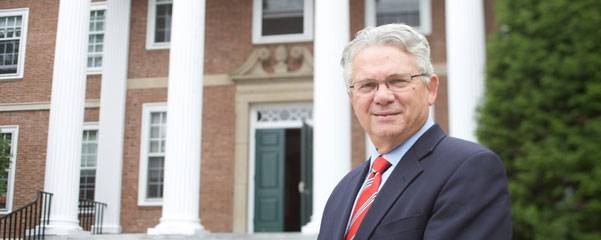Four More Years
Q&A with Tuck Dean Paul Danos on his reappointment to a fifth term.

Paul Danos says he didn’t have a blueprint for the future of Tuck when he first signed on as dean 16 years ago. But he was undeterred. “I was extremely confident I could do it,” recalls Danos, “without knowing what ‘it’ was. At first I, was guided by general principles—the detail plans came later as our great team took on initiative after initiative.”
Earlier this month, Danos, the Laurence F. Whittemore Professor of Business Administration, was reappointed to a fifth term as dean. Danos is the longest-serving dean among top-tier business schools, and by the end of his next term, will have held the position longer than anyone in the history of the school; already, more than 40 percent of Tuck’s nearly 9,000 living alumni have graduated under his watch. “No matter how long the tenure, though,” says Danos, “we are all just playing a part in the ongoing story of this great institution.”
We sat down with Danos on the occasion of his reappointment to learn more about his decision to remain as dean, and what the future holds for Tuck.
The average tenure for deans at business schools is less than five years. You’ve just signed up for your fifth four-year term. Why?
The most important part of any job, particularly one that last 16 years, is that feeling of continuous progress. I take a long-term view, and that sense of steady progress is very gratifying. I feel like Tuck is getting better all the time. So I’m still extremely excited about what we’re doing now and where we are going to be in four years.
What are you looking forward to accomplishing in your next term?
There are four very interesting developments happening now. The first is our plan to bring Alumni Services into the 21st century through an array of online activities for alumni designed around their own specific interests and needs. Alumni Services is going to go from primarily face-to-face social events—getting together in clubs or at reunions—to a process where we are constantly gauging what people want and responding to it. It will feature a smart database with smart responses that will push information to alumni about their colleagues and the school, along with faculty ideas, research, and teaching. Our goal is to take the two years a person spends at Tuck and extend the experience over their lifetime.
Related to this idea is something we’re calling “faculty circles.” Here, we are going to connect experts in the business world with our faculty for interactive discussions that will add real value to alumni. While our faculty’s focus will still be on teaching within the MBA program, this will allow them to share their expertise more broadly.
We are always trying to fine-tune the pedagogy that we use in our core curriculum and will be experimenting with the use of technology to deliver some of the content currently taught in the classroom. This will allow us to provide more opportunities for discussion in smaller sections. We want our experienced students to take more of an intellectual lead, guided by our outstanding faculty. Tuck is the kind of place where we can experiment like this and still maintain our core values.
Lastly is the joint venture Tuck has embarked on with The Dartmouth Institute for Health Policy and Clinical Practice—the new Master of Health Care Delivery Science. Here, we are using new technologies to deliver content to students who are leaders in health care clinics and hospitals. That’s something new for us, and it will lead to other spin-off opportunities and innovations.
What is the role of the MBA degree today, and where do you see it going in the future?
The world is exploding with opportunity. There are more and more companies out there who want the best and brightest. And our students, who average 30 years of age when they graduate, are ready for it, both aspiration-wise and intellectually. This demand for great managers comes as market-based economies dominate. Religion, government, and military used to be the dominant force in many countries. Now it is business. As long as the market system works and remains the dream and hope of most of mankind, and people believe in trading regimes where competition determines winners, then companies will have the incentive to seek out the very best talent. And we can give it to them. I’m very bullish on MBA programs like Tuck that train the best managers to lead competitive businesses.
So is the world demanding something different of its business leaders?
We are witnessing a period of extraordinary growth in the scope and complexity of global business, which means that leaders must be even more capable of making wise, long-term decisions. The business world still demands expertise and industry knowledge, but the world is also asking future leaders to be more socially aware, to create sustainable industries, and to be able to articulate broadly the role of business. It is not enough to be a hard-nosed businessperson; you also have to be sensitive to human beings, society, the markets, politics, and governments. You really have to be a Renaissance man or woman to be an outstanding leader, and in the future, that will be even truer. Tomorrow’s business leaders—the kind of people our students aspire to be—will be successful if they prove themselves capable of this. Tuck students get two years of practice doing this. We specialize in developing well-rounded, general managers who are sensitive to the many constituencies in business relationships. Our scale and the caliber of student we select helps us accomplish this. It gives us an advantage in providing our graduates with a broader experience that goes beyond the fundamentals of business.
May 2011